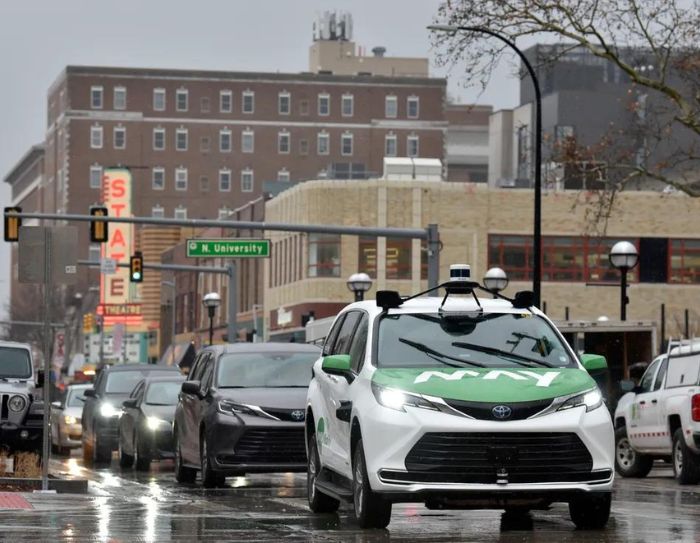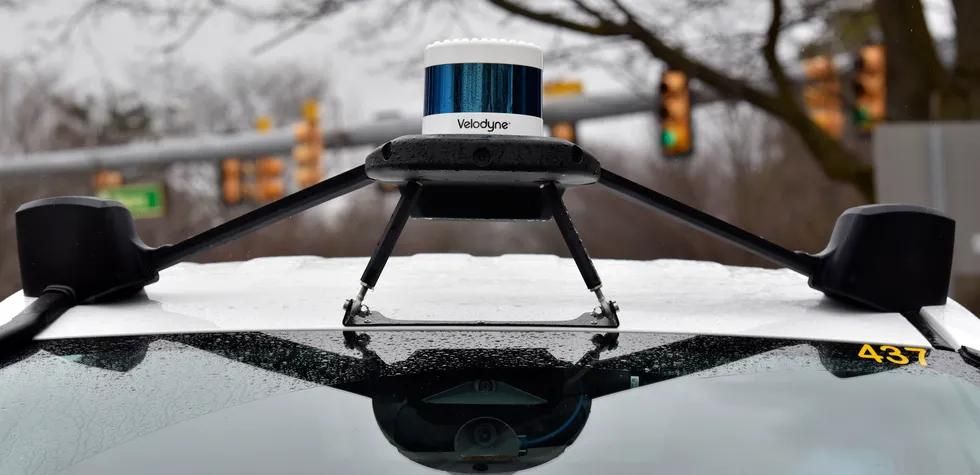January 25, 2023

Ann Arbor — As some question the future of fully autonomous vehicles, one smaller Ann Arbor-based AV company is pushing forward with a different strategy to increase mobility where needed.
May Mobility, backed by Toyota Motor Corp. and other big-name corporations, plans to take the safety driver out of its AVs this year and expand outside the three cities where it’s currently operating. Unlike other AV companies, May is focused on contracting with governments and businesses instead of going directly to consumers. The strategy is less costly and the feats aren’t as extreme, but that doesn’t mean the technology isn’t capable.
“If you’re a robotaxi business, what you need to do is you basically need to boil the ocean … solve all of the technology problems, build the hardest vehicles, the most capable vehicles and deploy them in the largest quantities possible. That is a massively capital-intensive business,” May CEO Edwin Olson said in an interview. “Whereas what we’re doing is we are putting one foot in front of the other. We’ll start with smaller geo-fenced areas and grow them over time.”
Right now, May has service in Arlington, Texas; Grand Rapids, Minnesota; and Ann Arbor. The company hasn’t said where it plans to expand next.
Martin French, U.S. managing director at Berylls, a global automotive consulting group, likes May’s business-to-government (B2G) and business-to-business (B2B) approach, along with its “diverse” group of investors and says: “They’re going to be a real one to watch in 2023.”
French and other experts expect to see the AV space continue to cool off this year as companies realize the cost without an immediate payoff — especially in the midst of a potential recession — and the need to focus on getting more electric vehicles on the road.
“We’re going to see some interesting consolidation in that space particularly in the B2C side,” French said. But automakers, investors and consumers are still intrigued by the potential of AV tech even though the fanfare around it has died down some.
General Motors Co., for example, is still betting on Cruise LLC, the AV company in which it has a majority stake, will be a multibillion-dollar company. By the end of this decade, GM projects Cruise will bring in annual revenue of $50 billion with its commercial electric fleet of AVs. Last year, GM bought out SoftBank’s equity ownership stake in the company.
Cruise is offering driverless rides in San Francisco and expanded into Phoenix and Austin. This year “marks the beginning of our rapid scaling phase, where we plan to churn through the backlog of users waiting to use our service, ramp up our operations and start to generate meaningful revenue,” Cruise CEO Kyle Vogt said during GM’s third-quarter earnings call in October.
Meanwhile, Ford Motor Co. and Volkswagen AG announced last fall they would absorb AV company Argo AI, showing the difficulties with commercializing AV tech. Ford said it would shift its focus from Level 4 fully self-driving tech to hands-free Level 2+ and Level 3 tech.
At the time, Ford CEO Jim Farley said “fully autonomous vehicles at scale are a long way off and we won’t necessarily have to create that technology ourselves.”

Photo courtesy of The Detroit News.
Stellantis NV, which provides Chrysler Pacifica plug-in hybrid minivans to AV company Waymo LLC, in November announced it acquired Hungarian autonomous driving startup AiMotive. The transaction, said Ned Curic, Stellantis’ chief technology officer, will help to accelerate the maturity of the company’s STLA AutoDrive, the automaker’s updateable software platform focused on autonomy that will launch on vehicles starting next year. AiMotive’s simulation, data pipeline management and validation tools are the best in the business, he said.
“It’s small, it’s very inexpensive, phenomenal technology,” Curic told The Detroit News during the CES consumer electronics trade show in Las Vegas. “And we’re going to just embed that technology as part of AutoDrive. We’re not saying we’re going to get a full autonomous driving vehicle and we’re going to put up $2 billion a year or whatever it is that people are spending. … We needed to accelerate learning.”
May Mobility, founded in 2017, is moving forward with its B2G and B2B strategy. It raised $111 million in its Series C round of funding, bringing its total investment after three rounds of funding to $194 million. SoftBank, State Farm Ventures, Next Century Ventures, SAIC, Wanxiang, Karma and 10x Group are all invested in the growing company with more than 200 employees.
In 2021, May’s AV technology was incorporated on a Lexus vehicle, marking the first time it was integrated into an automaker’s platform. May has since started using Toyota’s Sienna Autono-MaaS vehicle platform and last fall launched the first Americans with Disabilities Act (ADA)-compliant AVs in Grand Rapids, Minnesota, with the Sienna.